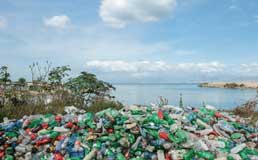Oceans apart: the case for keeping our waters plastic-free
Also, download this story from the electronic issue here
This article is by Kevin Brown, Chief Supply Chain Officer, Dell, with an introduction by Adrian Grenier, actor, entrepreneur and Dell Social Good Advocate.
" The ocean is a common pool resource, which means it is owned by all yet its destruction belongs to no one. But we are not free from blame or from consequence. No, the destruction of our ocean means the destruction of our own humanity. Our world’s ocean creates over 70% of our oxygen — that’s every other breath. Ensuring the health of our oceans by proxy ensures the health of ourselves, our children, our communities, and our economies. And as big as the ocean is, the tolls of mass consumerism, irresponsible behaviours, and insufficient recycling infrastructure have inflicted damage so extreme that we risk injury beyond repair. The global ocean crisis is concerning, but it also presents an opportunity for businesses to rethink their practices. While our man-made weapons of ocean destruction are varied, there is one weapon that we as consumers and business leaders wield power over every day. That weapon is plastic. I firmly believe that companies have a responsibility to take ownership over the full lifecycle of their plastic products so they never see their name wash up on the beach against the feet of children in countries worlds over. But how then do we re-approach our ocean not as a post-consumer plastic junkyard, but as a critical component to international industry? One way is through the growth of a circular economy. As an entertainer, I had nascent experience with supply chains before my work with Dell. Now, I understand the challenges of innovating business as usual for the benefit of our ocean. Innovation is not impossible, as Dell's successful ocean plastic programme has proven. If more business leaders commit to holding themselves accountable and challenge one another, together we will build a more resilient and more profitable global ocean." -Adrian Grenier
An endless supply of plastic
Working in supply chain management for 20 years, much of my career has been marked
by plastic. The amount of unmanaged plastic waste entering the ocean – known as
plastic-waste leakage – has reached crisis levels and has caused significant economic and
environmental damage. At Dell, we’ve scaled efficient methods of sourcing and recycling
 plastic in both products and packaging. Just in February 2017, we reached our 2020
milestone of recycling around 22,700 tonnes of post-consumer recycled plastics and other
sustainable materials into Dell products.
Despite this experience, I had minimal
understanding of the negative impact
plastics have on our ocean health. Together,
Dell, Adrian and I started to learn more.
plastic in both products and packaging. Just in February 2017, we reached our 2020
milestone of recycling around 22,700 tonnes of post-consumer recycled plastics and other
sustainable materials into Dell products.
Despite this experience, I had minimal
understanding of the negative impact
plastics have on our ocean health. Together,
Dell, Adrian and I started to learn more.
Plastics are the workhorse material of the modern economy but are also likely to be used just once and then discarded. In places that lack recycling infrastructure, the plastic eventually makes its way to our ocean. As floating trash, plastic photodegrades into toxic microplastic. These tiny pieces are small enough to mingle with plankton, the organisms at the base of the food web that support many fish and whale species. Marine life today is riddled with these noxious particles that will outlast them by centuries.
The scale of the problem is almost inconceivable. Each year, at least 8 million tonnes of plastics find their way into the ocean, which is equivalent to dumping the contents of one garbage truck into the ocean every minute. If this carries on, the ocean is expected to contain 1 tonne of plastic for every 3 tonnes of fish by 2025, and by 2050, more plastics than fish (by weight), as illustrated in the video by Dell and the Lonely Whale Foundation1. Consider that – more plastic than fish.
Food chain contaminants
Like, I have had to explain to my 10-year-old daughter, when birds or fish ingest the plastic in the sea, these little creatures die of starvation while their stomachs bulge full. Meanwhile, plastics travel up the food chain.
The science shows that degrading plastics are more likely to attract contaminants and pass endocrine disruptors and carcinogens further up the food chain. Tests have already shown ingestion causes tumours in lab animals. The prognosis for people is also likely to be grave.
There’s a financial price to pay as well. Plastic causes US$13 billion of damage to the marine environment each year according to the UN, which affects the fishing, shipping and tourism industries. This figure doesn’t factor in the colossal financial implications for the health sector.
We all know that cutting out fish from our diet isn’t the answer. What the answer is that this matters – to our kids and our economy – and we have the power to change this fate.
Recycling ocean plastics
Asia is currently the global economic powerhouse that drives the world economy. However, the region also drives the world’s environmental problems where it is home to the most polluted cities and oceans. As much as 60% of ocean plastics come from Asia, largely coming from China, Indonesia, the Philippines, Thailand and Vietnam.
According to a report by Oceans Conservancy in 2015, with a concerted commitment to reducing waste, the global ocean plastic leakage will reduce by approximately 45% over the next ten years. Waste reuse, reduction, and recycling are longterm goals for Malaysia, which has set a target of 22% household recycling rate by 20202
From a corporate standpoint, with sufficient intervention and collaboration across sectors, we can stem the plastic tide. At Dell, we undertook a feasibility study to determine if we could use ocean plastics in our consumer packaging. The success of that study has enabled us to create a commercial-scale supply chain dedicated to collecting and recycling ocean plastic for use as a packaging material.
To start, we are using recycled ocean plastics in our packaging for the Dell XPS 13 2-in-1. This switch helps us fulfill our mission to keep packaging out of the waste stream and within the circular economy. We estimate that in 2017, the pilot will keep close to 7,300 kg of plastic from entering our ocean.
This figure will climb quickly as we develop and expand the supply chain to include other Dell products and it will continue to grow as we work across industries to scale our research with suppliers and customers.
Sharing best practices
Getting to this point has been a significant undertaking (ten months to be exact), but we’re happy to share our blueprint so others can achieve the same, if not more, with greater ease. Why? Because we will only make a real difference if other companies join the cause to reduce ocean plastics. Speaking candidly, we don’t care if in five years’ time no one remembers who shipped the first ocean plastics packaging – only that there was a 100th, 1,000th, 10,000th company to do so.
At The Economist’s World Ocean Summit in February 2017, we joined world leaders across sectors to collaborate on what it will take to create an infrastructure in real hotspot areas, where plastics are being spewed into the sea at exponential rates. It will take a commitment on the part of businesses, governments, NGOs and the communities themselves to work on changing attitudes related to the behaviours that create the trash problem. We will have to work together as well to find the resources and invest in the solutions that can bring the ocean plastics back into the economy. We hope you will join us.
(PRA)Copyright (c) 2017 www.plasticsandrubberasia.com. All rights reserved.




















































